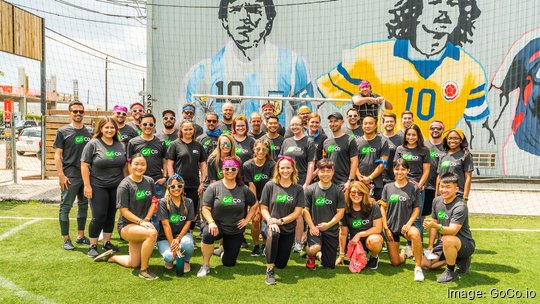
A Houston-based human resources startup has made its first-ever acquisition to target remote-work management.
GoCo.io bought Canada-based employee experience and analytics platform WFHomie. Financial terms of the deal were not disclosed.
The deal will bring WFHomie’s employees into the GoCo fold. The Houston company had 130 employees as of November, but an exact total after the WFHomies acquisition was not available.
WFHomie specializes in analytics for remote employees. Its products and services include employee recognition software as well as a series of bots that track worker data.

Pavla Bobosikova, co-founder and CEO of WFHomie, told the Houston Business Journal the company was addressing problems with HR shortages.
“We actually launched as a response to the Covid-19 pandemic and the acceleration of remote work,” Bobosikova said. “Specifically, when Covid hit and so many people started really working remotely, there was just no infrastructure to help HR teams check in on their employees make sure everybody has what they need.”
WFHomie’s products are expected to help GoCo expand its current offerings by continuing its focus on employee engagement from an HR perspective, GoCo marketing director Allie Collins told the HBJ. GoCo’s technology is a software that allows employers to manage insurance, benefits, payroll and taxes in one location.
“We're strategically and culturally well-aligned in terms of GoCo’s continued march towards focus on employee engagement,” Collins said. “Every single quarter, we're releasing new features aimed at similar employee experiences.”
Bobosikova said she met GoCo co-founder and CEO Nir Leibovich through a mutual acquaintance. While the two companies had different approaches to HR management, their goals were aligned, she said.
“I feel like the HR tech landscape has always been super fragmented, which makes HR’s job very difficult because they had to go into all these different platforms to do all sorts of different things,” Bobosikova said. “[GoCo’s products are] how HR will look like moving forward. And I think you'll continue to see a lot of consolidation around [similar technologies] in the market.”
The deal follows GoCo’s $15 million Series B funding round in November, led by Austin-based ATX Venture Partners. The company has raised $27.5 million to date.
According to previous Securities and Exchange Commission filings, GoCo raised $1.8 million in seed funding in 2015 followed by a $2.5 million post-seed round led by ATX Venture Partners under its former name, ATX Seed Ventures. GoCo crossed the $10 million mark in 2019 thanks to a $7 million Series A round led by ATX Venture Partners.
The company’s investment in remote work parallels a trend in employee expectations. GoCo’s 2023 State of Human Resources — a survey of over 500 HR professionals — identified remote-work management as an HR industry trend to look out for in 2023.
Some big-name employers are increasingly requiring employees to return to the office. Morgan Stanley (NYSE: MS) CEO James Gorman recently said working remotely was not an employee choice. Meanwhile, Walt Disney Co. (NYSE: DIS), NewsCorp and Starbucks Corp. (Nasdaq: SBUX) have all told employees to get back to the office. Elon Musk, CEO of Tesla (Nasdaq: TSLA) and Twitter (NYSE: TWTR), also made waves last year when he mandated at least 40 hours in person at the office. Citigroup (NYSE: C) CEO Jane Fraser said low-performing workers at the company were not allowed to work remotely.
Despite businesses pushing employees to return to the office, the number of high-paying remote jobs continues to grow. The share of posted jobs that pay more than $100,000 per year and offer remote work has reached 36%, according to high-paying careers site Ladders Inc. That's up from 18% at the end of 2021.
The National Bureau of Economic Research found that cutting commute times due to remote work saved American workers an average of 55 minutes a day, and 40% of that time is used to work for their employer.
Meanwhile, a Joblist survey found that 49% of millennials wanted a fully remote work environment compared to 27% of Generation Z employees.





